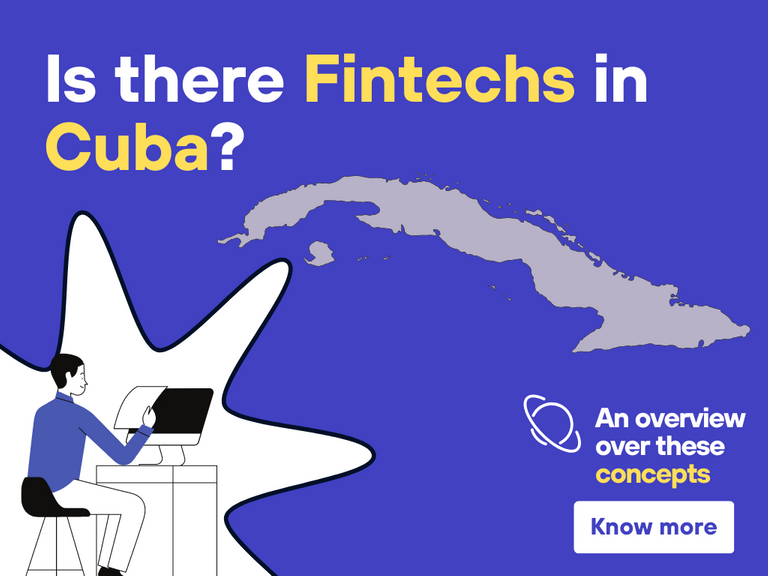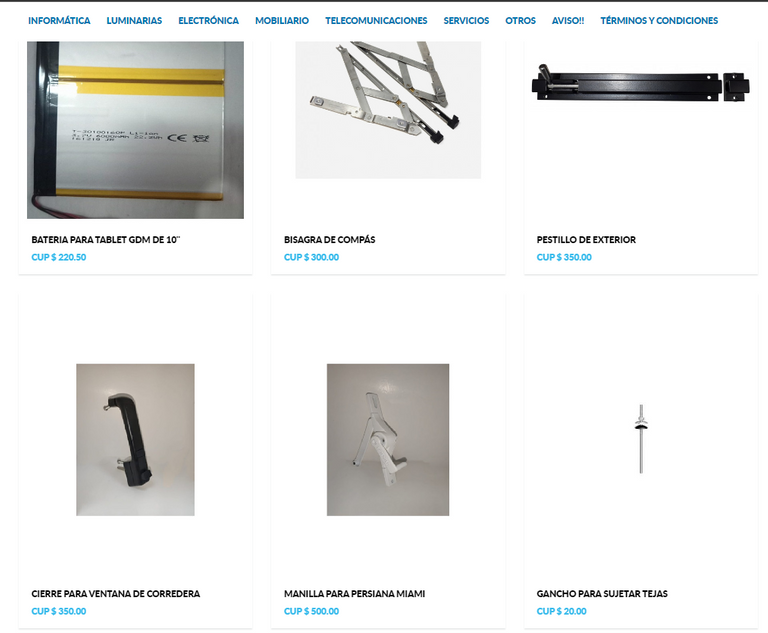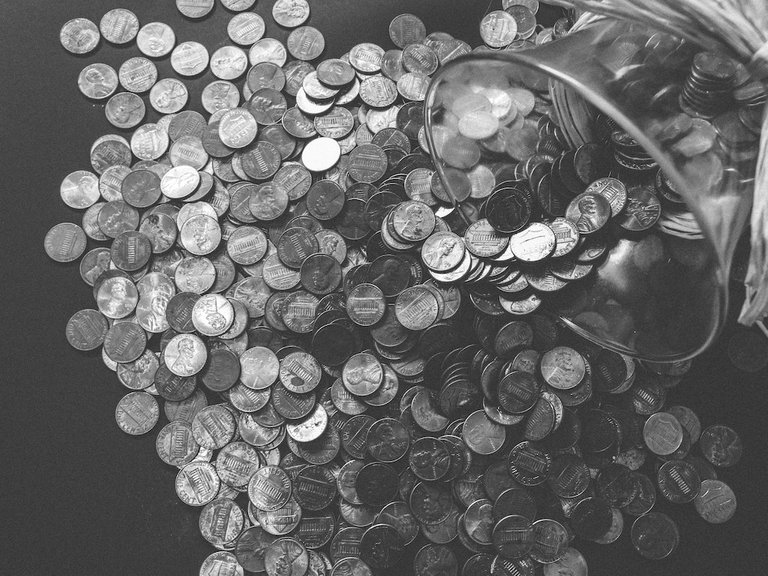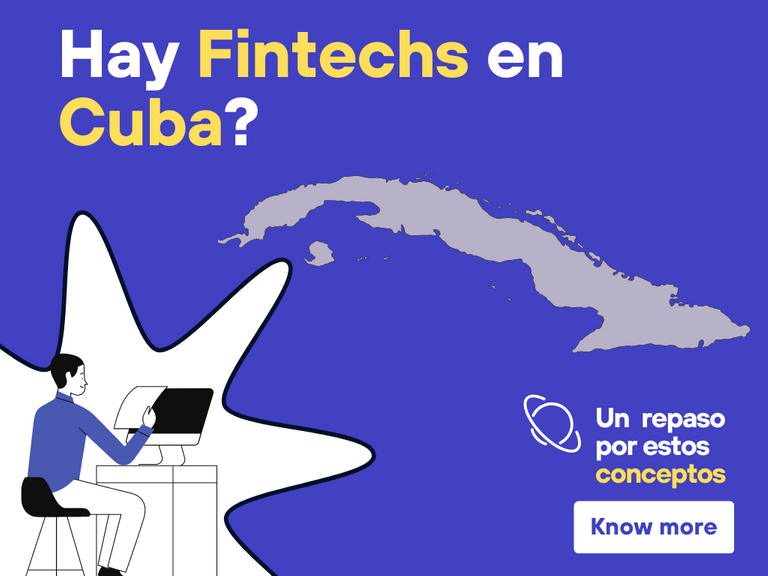
According to the website Cubadebate, in November 2022, 83 percent of bodegas had facilities for electronic payment. What does this mean? In theory, any Cuban going to the "market" where they are offered basic necessities (in quantities regulated by the State) should be able to pay using his or her cell phone. Encouraging, isn't it?
Well, it is more common that very few people make use of this facility, either because of ignorance or because not everyone has a smart device or the knowledge to do so. If we take into account that, according to data from the National Statistics and Information Office, Cuba continues to have a high rate of population aging, it is understandable that grandparents or senior citizens, who commonly run errands, are not familiar with these technologies.
E-commerce has been boosted by the government in recent years and virtual stores have been created, such as this one called gedeme.enzona.net in which very random things are offered. See for yourself:

It is true that some of these items may be necessary and useful for the home, but I find it funny that this "store" has totally empty sections such as furniture, also, they do not have the slightest management from the point of view of marketing. They have no customer reviews or comments section, in short... I gave just one example, but I think you can understand my point that although it is the will of the State, things are not being done as they should, largely due to the general shortage that the country is experiencing.
The companies Xetid and Gedeme are the ones that develop from the state sector the applications or websites to implement e-commerce in the country. This is how payment gateways and mobile banking applications such as Enzona and the most popular of all, Transfermóvil, have emerged. Of the former I must say that I didn't even remember the password from when I created the account, I think in 2019 or 2020, but I never got to use it. I know it had great boom and served to pay electricity, gas, telephone, pay for purchases in some stores among other actions.
While Transfermóvil is the same, but with a mobile application that is constantly updated and constantly maintained. Recently, with the shortage of stamps for example, they implemented the purchase of digital stamps through the application, which can be used in some legal procedures. Personally I use Transfermóvil to take advantage of the 5% discount that is executed every time I pay for any service. I think this application is one of the most used in Cuba today, even though not everyone uses e-commerce.

Assets, currencies e inflation
The panorama of the Cuban economy is not the best at present. Right now there are any number of different currencies circulating in Cuba. And almost any money has more value than the Cuban peso. This favors the emergence of an informal market based on the speculation of values and the unbridled rise in prices that inflation brings with it.
But the fact that so many currencies are circulating is not in itself a bad thing. What is bad is the devaluation of our local currency, which is becoming more and more worthless because of the depreciation it is undergoing. Nobody wants to holdear Cuban pesos, and not even US dollars or euros.
People live from day to day spending whatever currency solves their daily problems, but when it comes to saving for their future, none of them are safe. Neither are bank accounts guarantees for savings, as there are no attractive interest rates and hardly any real value in the amount of money received as income.
This seemingly catastrophic scenario would have a better face if the potentialities of the Internet and the constant opportunities it now offers with the emergence of the Web3 and the blockchain were exploited. But the state's position on cryptocurrency issues is rather contemplative and non-interventionist in such personal matters.
Given the insecurity and risks that propitiate scams with these assets that move in wallets through cyberspace, the Central Bank of Cuba distanced itself from any criminal action with these cryptocurrencies. "Natural persons assume the risks and responsibilities that in the civil and criminal order derive from operating with virtual assets and virtual asset service providers that operate outside the Banking and Financial System, even though transactions with virtual assets between such persons are not prohibited."
Source, quoted on the BCC official website.
However, from the point of view of entrepreneurs and freelancers, this 2021 rule is quite positive in that it does not prohibit transactions occurring at the individual level. This has allowed, for example, the establishment of small services that make life easier for thousands of Cubans who use cryptocurrencies, such as Qvapay, a payment gateway developed by Erich García Cruz.
The world of cryptoassets offers enormous potential for individuals to become sustainable and secure a better future. In 2009, with the appearance of Bitcoin, a digital revolution began in which these cryptocurrencies or cryptoassets have become a sort of digital money, without physical existence but with value granted by users, a principle that has different banking institutions in different countries in check, since for the first time money has not been centralized or controlled by regulatory agents.
To conclude this text, which has become a bit long, we can conclude that, although the finance and technology sector is still developing in Cuba, the state of adoption is rather primitive. Companies and startups in the country are working to develop innovative solutions in the field of finance and electronic payments, which is helping to foster financial inclusion in the country. However, the development of the fintech sector in Cuba still faces challenges, such as the need to improve the country's technological infrastructure and the need for digital literacy.

Thanks for reading! 🙌
You can support me with LN
via v4v if you liked my work.
Text by the author, @garorant.
Cover image edited on Canva free version.
Post writen in spanish and translated with Deepl to English.
All rights reserved ©, 2023.
Comercio Electrónico y Fintechs en Cuba

De acuerdo con el sitio web Cubadebate, en noviembre de 2022 un 83 por ciento de bodegas contaban con facilidades para el pago electrónico. ¿Qué significa esto? Que en teoría cualquier cubano al dirigirse al "mercado" en el cual le ofertan los productos de primera necesidad (en cantidades reguladas por el Estado) debería tener la posibilidad de pagar utilizando su teléfono móvil. Alentador, ¿verdad?
Pues más común es que muy pocas personas hagan uso de esa facilidad, bien por desconocimiento o porque no todo el mundo dispone de un dispositivo inteligente ni de los conocimientos para ello. Si tenemos en cuenta que, según datos de la Oficina Nacional de Estadísticas e Información, Cuba continúa con un alto índice de envejecimiento poblacional, es comprensible que los abuelos o personas de la tercera edad, quienes comúnmente realizan los mandados, no estén familiarizadas con estas tecnologías.
El comercio electrónico ha sido potenciado por el gobierno en los últimos años y se han creado tiendas virtuales, como esta llamada gedeme.enzona.net en la cual se ofertan cosas muy aleatorias. Vean ustedes mismos:

Cierto que alguno de estos artículos pueden resultar necesarios y útiles para el hogar, pero me causa gracia que esta "tienda" tenga secciones totalmente vacías como las de mobiliaria, además, no cuentan con la más mínima gestión desde el punto de vista de marketing. No poseen reseñas de clientes ni sección de comentarios, en fin... Puse solo un ejemplo, pero creo que se entiende mi punto de que aunque es una voluntad del Estado, no se están haciendo las cosas como debería en gran medida por la escasez general que vive el país.
Las empresas Xetid y Gedeme son las que desarrollan desde el sector estatal las aplicaciones o sitios web para implementar el comercio electrónico en el país. Así es como han surgido pasarelas de pago y aplicaciones de banca móvil como Enzona y la más popular de todas, Transfermóvil. De la primera debo decir que no recordaba ni la contraseña de cuando me creé la cuenta, creo que en 2019 o 2020, pero no llegué a utilizarla nunca. Sé que tuvo gran auge y servía para pagar servicios de electricidad, gas, teléfono, pagar compras en algunas tiendas entre otras acciones.
Mientras que Transfermóvil es lo mismo, pero con una aplicación móvil que sí es actualizada constantemente y se le da mantenimiento constantemente. Hace poco, con la escasez de sellos por ejemplo implementaron la compra de sellos digitales a través de la aplicación, los cuales pueden ser usados en algunos trámites legales. En lo personal utilizo Transfermóvil para aprovechar el descuento del 5% que se ejecuta cada vez que pago algún servicio. Esta aplicación creo que es de las más usadas en Cuba en la actualidad, a pesar de que no todos utilizan el comercio electrónico.

Fuente
Activos, monedas e inflación
El panorama de la Economíacubana no es el mejor en la actualidad. Ahora mismo hay en Cuba circulando cualquier cantidad de monedas diferentes. Y es que casi cualquier dinero tiene más valor que el peso cubano. Esto favorece el surgimiento de un mercado informal basado en la especulación de valores y a la subida de precios desenfrenada que trae consigo la inflación.
Pero que estén circulando tantas monedas no es en sí malo. Lo que es malo la devaluación que está sufriendo nuestra moneda local que cada vez se vuelve más un papel sin valor por la depreciación que está teniendo. Nadie quiere holdear pesos cubanos, y ya ni siquiera dólares americanos o euros.
La gente vive el día a día gastando cualquier moneda que le resuelva sus problemas cotidianos, pero a la hora de ahorrar para su futuro, ninguna es segura. Tampoco las cuentas de banco son garantías de ahorro, pues no existen tasas de interés atractivas y apenas la cantidad de dinero recibida como income no tiene valor real.
Este escenario aparentemente catastrófico tendría una mejor cara si se aprovecharan las potencialidades de Internet y las constantes oportunidades que ofrece ahora con el surgimiento de la Web3 y la blockchain. Pero la posición del Estado en cuestiones de criptomonedas es más bien contemplativa y de no intervención en esos asuntos personales.
Dado la inseguridad y los riesgos que propician estafas con estos activos que se mueven en billeteras por el ciberespacio, el Banco Central de Cuba se deslindó de cualquier acción delictiva con estas criptomonedas. “Las personas naturales asumen los riesgos y responsabilidades que en el orden civil y penal se derivan por operar con activos virtuales y proveedores de servicios de activos virtuales que funcionan al margen del Sistema Bancario y Financiero, aun cuando no están prohibidas las transacciones con activos virtuales entre dichas personas”
Fuente, citado en la página oficial del BCC.
Sin embargo, desde el punto de vista de los emprendedores y los freelancers, esa norma de 2021 es bastante positiva por cuanto no prohibe las transacciones ocurridas a nivel individual. Esto ha permitido por ejemplo el establecimiento de pequeños servicios que facilitan la vida a miles de cubanos que utlizan criptomonedas, como es el caso de Qvapay, pasarela de pagos desarrollada por Erich García Cruz.
El mundo de los criptoactivos ofrece un potencial enorme para que los individuos puedan llegar a ser sostenibles y garantizar un futuro mejor. En 2009, con la aparición de Bitcoin, comenzó toda una revolución digital en la que estas criptomonedas o criptoactivos han venido a ser una suerte de dinero digital, sin existencia física pero con valor otorgado por los usuarios, principio que tiene en jaque a diferentes instituciones bancarias de diferentes países, pues por primera vez el dinero no ha estado centralizado ni controlado por agentes reguladores.
Para culminar este texto que se ha hecho un poco extenso, podemos concluir que, aunque el sector de las finanzas y las tecnologías aún está en desarrollo en Cuba, el estado de adopción es más bien primigenio. Empresas y startups en el país están trabajando para desarrollar soluciones innovadoras en el ámbito de las finanzas y los pagos electrónicos, lo que está contribuyendo a fomentar la inclusión financiera en el país. No obstante, el desarrollo del sector fintech en Cuba sigue enfrentando desafíos, como la necesidad de mejorar la infraestructura tecnológica en el país y una imprescindible alfabetización digital.

Gracias por leer! 🙌
Puedes apoyarme con LN
vía v4v si te gustó mi trabajo.
Texto por el autor, @garorant.
Cover imagen editada en Canva versión gratuita.
Post escrito en español y traducido en Deepl al inglés.
Todos los derechos reservados ©, 2023.
Posted Using LeoFinance Alpha
Post writen in spanish and translated with Deepl to English.
All rights reserved ©, 2023.



Dado la inseguridad y los riesgos que propician estafas con estos activos que se mueven en billeteras por el ciberespacio, el Banco Central de Cuba se deslindó de cualquier acción delictiva con estas criptomonedas. “Las personas naturales asumen los riesgos y responsabilidades que en el orden civil y penal se derivan por operar con activos virtuales y proveedores de servicios de activos virtuales que funcionan al margen del Sistema Bancario y Financiero, aun cuando no están prohibidas las transacciones con activos virtuales entre dichas personas”
Fuente, citado en la página oficial del BCC.

Cover imagen editada en Canva versión gratuita.
Post escrito en español y traducido en Deepl al inglés.
Todos los derechos reservados ©, 2023.
Posted Using LeoFinance Alpha
Congratulations @garorant! You have completed the following achievement on the Hive blockchain And have been rewarded with New badge(s)
Your next target is to reach 3000 comments.
You can view your badges on your board and compare yourself to others in the Ranking
If you no longer want to receive notifications, reply to this comment with the word
STOPTo support your work, I also upvoted your post!
https://leofinance.io/threads/garorant/re-garorant-paugp7gj
The rewards earned on this comment will go directly to the people ( garorant ) sharing the post on LeoThreads,LikeTu,dBuzz.
This post has been manually curated by @finguru from Indiaunited community. Join us on our Discord Server.
Do you know that you can earn a passive income by delegating your Leo power to @india-leo account? We share 100 % of the curation rewards with the delegators.
100% of the rewards from this comment goes to the curator for their manual curation efforts. Please encourage the curator @finguru by upvoting this comment and support the community by voting the posts made by @indiaunited.